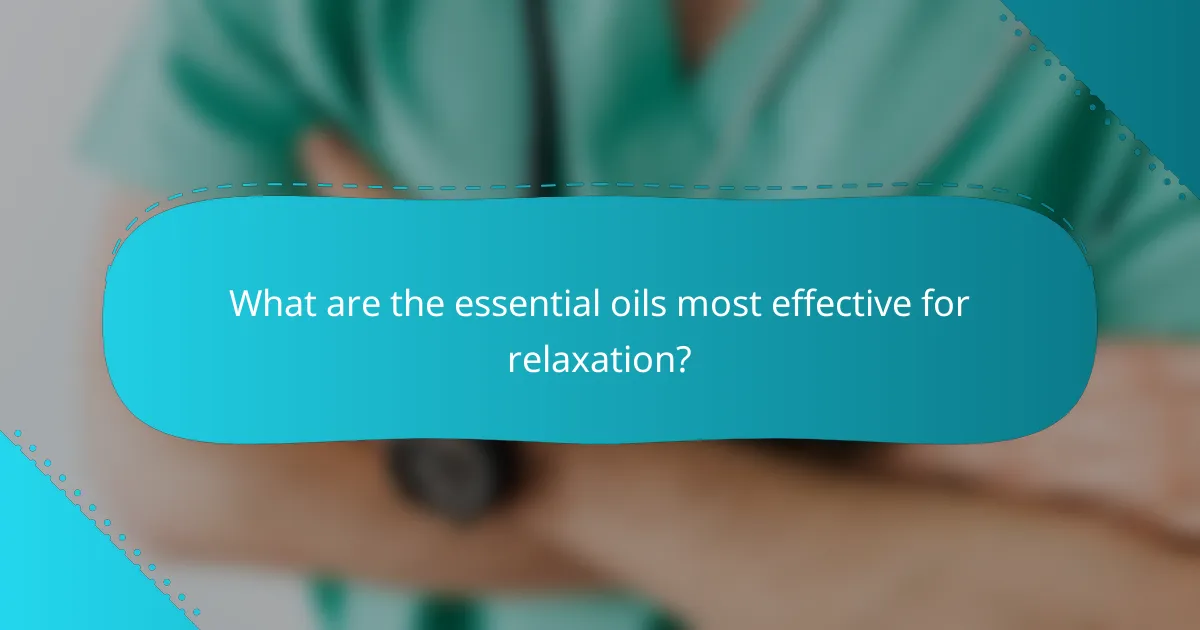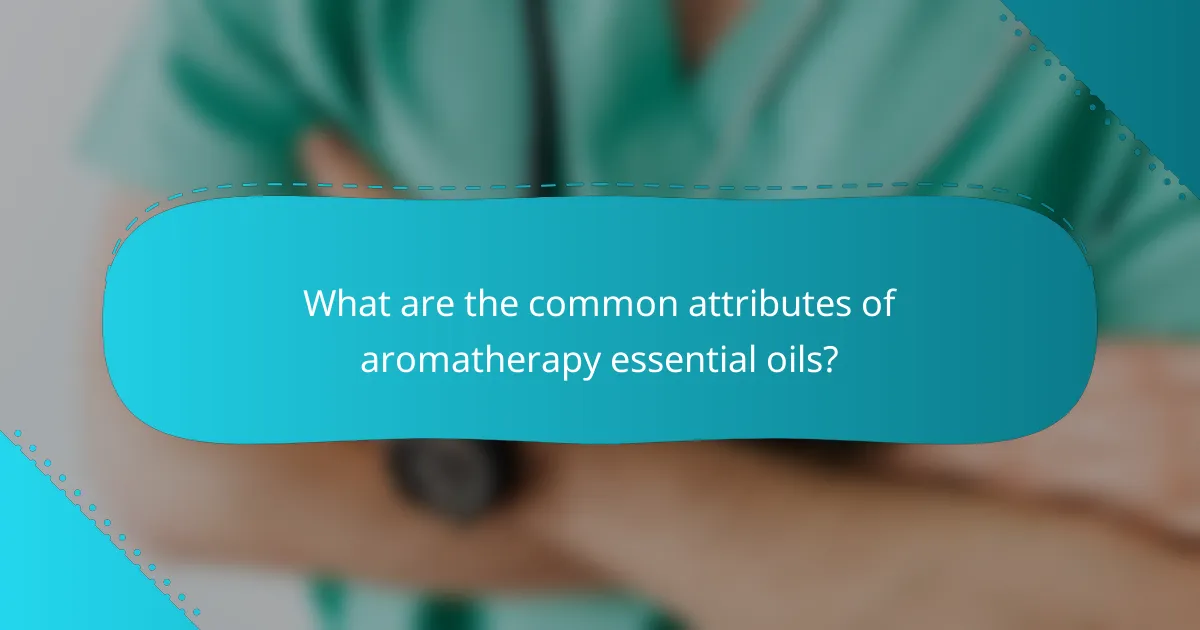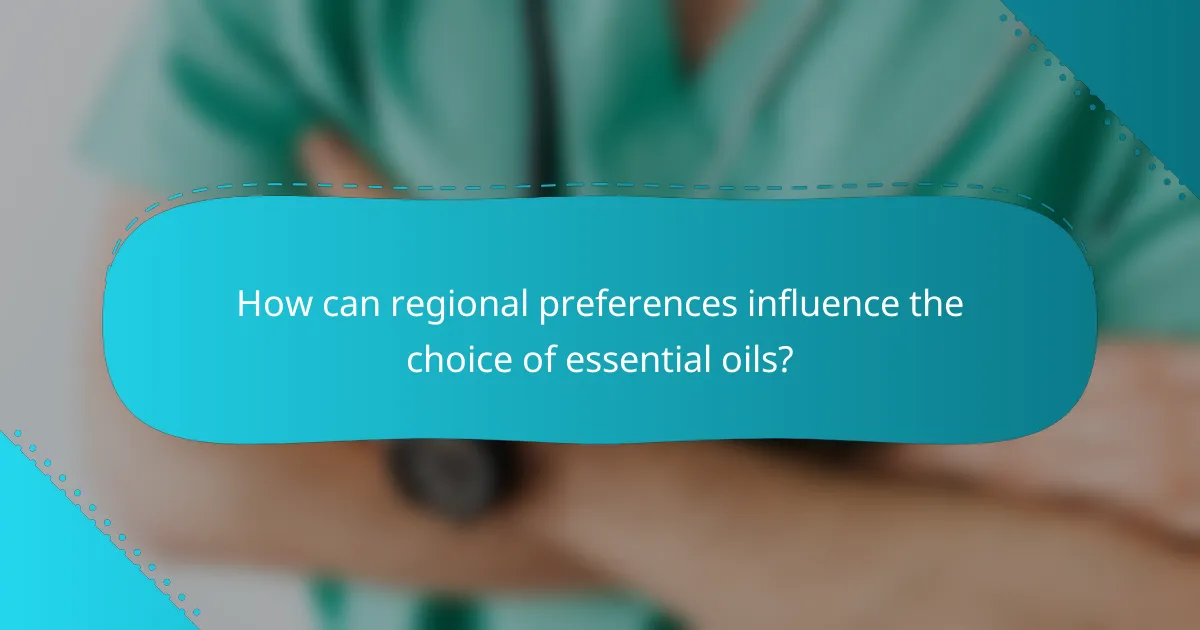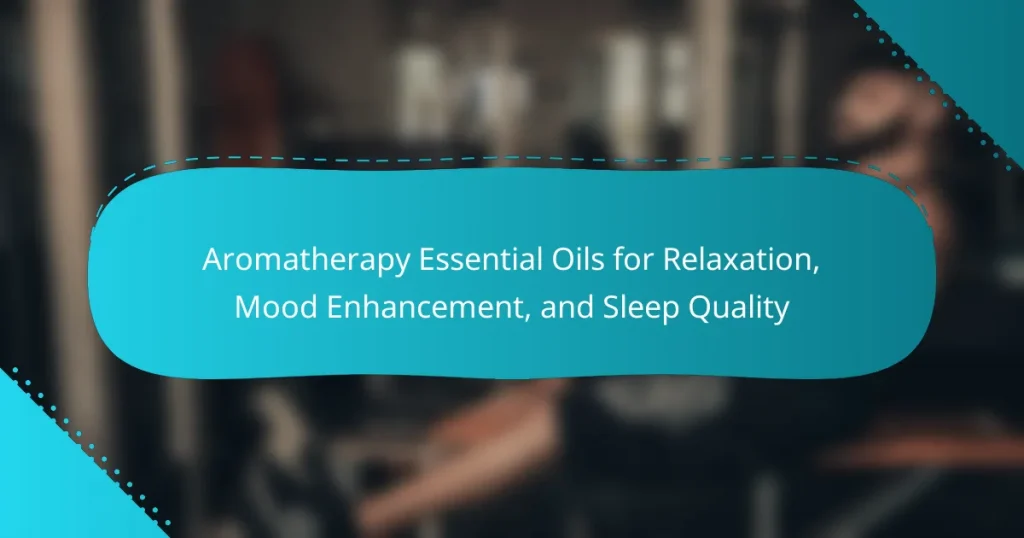Aromatherapy essential oils can significantly enhance relaxation, improve mood, and promote better sleep quality. Key oils like lavender, chamomile, and bergamot are known for their calming effects and pleasant aromas. Understanding their unique properties and regional preferences can optimise their use. Best practices for effective application ensure safety and maximise benefits.

What are the essential oils most effective for relaxation?
Lavender, chamomile, and bergamot are the most effective essential oils for relaxation. These oils promote calmness and improve sleep quality. Lavender oil reduces anxiety and enhances mood, while chamomile oil is known for its soothing properties. Bergamot oil can uplift mood and decrease stress. Using these oils in aromatherapy can significantly enhance relaxation experiences.
How does lavender oil promote relaxation?
Lavender oil promotes relaxation by reducing anxiety and improving sleep quality. It contains linalool and linalyl acetate, compounds known for their calming effects. Studies show inhaling lavender oil can lower heart rate and blood pressure, enhancing feelings of tranquility. Its unique aroma signals the brain to release neurotransmitters that foster relaxation, making it a popular choice in aromatherapy practices.
What role does chamomile oil play in enhancing mood?
Chamomile oil significantly enhances mood by promoting relaxation and reducing anxiety. Its calming properties stem from unique compounds like bisabolol, which help alleviate stress. Studies show that inhaling chamomile oil can lead to improved emotional well-being and better sleep quality. This makes it a valuable tool in aromatherapy for those seeking natural mood enhancement.
Which citrus oils are beneficial for uplifting mood?
Citrus oils like sweet orange, lemon, and bergamot are particularly beneficial for uplifting mood. These oils contain compounds that promote feelings of happiness and reduce stress. Sweet orange oil is known for its refreshing scent and ability to enhance overall well-being. Lemon oil can invigorate the mind and boost energy levels. Bergamot oil, with its unique citrus aroma, is often used to alleviate anxiety and improve mood stability. Incorporating these oils into aromatherapy practices can significantly enhance emotional health.

What are the common attributes of aromatherapy essential oils?
Aromatherapy essential oils commonly share attributes that enhance relaxation, mood, and sleep quality. Key attributes include calming effects, pleasant aromas, and natural origins.
Calming effects are often linked to oils like lavender and chamomile, which help reduce anxiety and promote tranquility. Pleasant aromas contribute to mood enhancement, as scents can evoke positive emotions and memories. Natural origins signify that these oils are derived from plants, ensuring a holistic approach to wellness.
Unique attributes may include specific therapeutic properties, such as anti-inflammatory or sedative effects, found in particular oils. Rare attributes might involve specific extraction methods or regional sourcing that enhance the oil’s quality and efficacy.
How do essential oils influence sleep quality?
Essential oils improve sleep quality by promoting relaxation and reducing anxiety. Oils like lavender and chamomile have calming effects, leading to deeper sleep. Studies show lavender oil can increase sleep duration by 20%. Inhalation of these oils before bedtime enhances overall sleep satisfaction.
What are the different methods of using essential oils for relaxation?
Essential oils for relaxation can be used through various methods including diffusion, topical application, and inhalation. Each method offers unique benefits for mood enhancement and sleep quality.
1. Diffusion: Using a diffuser, essential oils disperse into the air, creating a calming atmosphere. Popular oils include lavender and chamomile.
2. Topical application: Diluting essential oils with a carrier oil allows for direct application on the skin. This method can help relieve tension and promote relaxation.
3. Inhalation: Simply inhaling essential oils directly from the bottle or a tissue can provide immediate calming effects.
These methods cater to individual preferences and enhance the overall relaxation experience.
What are the safety considerations when using essential oils?
Essential oils can pose safety risks if not used properly. Key considerations include dilution, skin sensitivity, and potential interactions with medications.
1. Always dilute essential oils before topical application to prevent skin irritation.
2. Conduct a patch test to check for allergic reactions.
3. Avoid ingestion unless under professional guidance.
4. Consult with a healthcare provider if pregnant, nursing, or on medication.
5. Store oils safely away from children and pets.
6. Be cautious with phototoxic oils, which can cause skin reactions when exposed to sunlight.

What unique benefits do specific essential oils offer?
Certain essential oils offer unique benefits for relaxation, mood enhancement, and sleep quality. For instance, lavender oil is renowned for its calming effects, promoting restful sleep. Bergamot oil elevates mood and reduces stress, while chamomile oil aids in relaxation and anxiety relief. Frankincense oil uniquely supports emotional balance and grounding, enhancing overall well-being. Each oil’s distinct properties contribute to improved mental and emotional health.
How does bergamot oil uniquely affect mood?
Bergamot oil positively affects mood by reducing anxiety and promoting relaxation. Its unique chemical composition, particularly linalool and linalyl acetate, contributes to its mood-enhancing properties. Studies indicate that inhaling bergamot oil can decrease cortisol levels, leading to improved emotional well-being. Additionally, its uplifting scent can stimulate the release of dopamine, enhancing feelings of happiness and reducing stress.
What makes ylang-ylang oil stand out for relaxation?
Ylang-ylang oil is renowned for its calming effects, making it exceptional for relaxation. This essential oil, derived from the Cananga odorata flower, contains unique compounds like linalool and geranyl acetate that promote tranquility. Studies indicate that inhaling ylang-ylang oil can lower heart rate and reduce stress levels. Its sweet, floral aroma enhances mood and fosters a sense of well-being, making it a popular choice in aromatherapy for improving sleep quality.

What rare attributes can enhance the effectiveness of essential oils?
Rare attributes that can enhance the effectiveness of essential oils include specific chemical compounds, unique extraction methods, and synergistic blends. For example, the presence of rare terpenes can significantly boost relaxation effects. Unique extraction methods, such as cold pressing, preserve delicate compounds that may enhance mood. Additionally, synergistic blends of oils can create a more potent effect than individual oils alone, improving sleep quality.
Which essential oils are known for their rare calming effects?
Lavender, chamomile, and ylang-ylang are essential oils known for their rare calming effects. Lavender oil is renowned for reducing anxiety and promoting sleep quality. Chamomile oil, with its unique soothing properties, alleviates stress and enhances relaxation. Ylang-ylang oil is rare for its ability to lower blood pressure while uplifting mood. Each oil contributes distinct attributes to aromatherapy, enhancing overall relaxation and well-being.
What unique blends are recommended for improving sleep quality?
Lavender, chamomile, and bergamot are unique blends recommended for improving sleep quality. Lavender essential oil has calming properties that promote relaxation. Chamomile is known for its soothing effects, reducing anxiety and aiding sleep. Bergamot can enhance mood while lowering stress levels. Combining these oils in a diffuser can create a tranquil environment conducive to restful sleep.

How can regional preferences influence the choice of essential oils?
Regional preferences significantly shape the choice of essential oils. Cultural beliefs, local flora, and climate influence which oils are favoured for relaxation, mood enhancement, and sleep quality.
For instance, lavender is widely appreciated in Western cultures for its calming effects, while sandalwood holds significance in Eastern practices for promoting tranquility. Additionally, regional availability affects choices; citrus oils may be more popular in warmer climates due to their refreshing qualities.
Consumer trends also play a role; organic and sustainably sourced oils are increasingly preferred in eco-conscious regions. This reflects a unique attribute where buyers prioritise environmental impact alongside aromatic benefits.
Understanding these regional nuances can enhance marketing strategies and product offerings in the aromatherapy sector.
What are the popular essential oil blends in different cultures?
Popular essential oil blends vary across cultures, each offering unique benefits for relaxation, mood enhancement, and sleep quality. In traditional Chinese medicine, a blend of lavender and bergamot is favoured for calming effects. In Indian Ayurvedic practices, sandalwood and frankincense are commonly used to promote tranquility. Mediterranean cultures often utilise a mix of rosemary and lemon for uplifting moods. In Native American traditions, cedarwood and sweetgrass are blended for grounding and relaxation. These cultural blends reflect diverse approaches to achieving mental and emotional well-being through aromatherapy.
How do local practices affect the use of aromatherapy for mood enhancement?
Local practices significantly influence the effectiveness of aromatherapy for mood enhancement. Cultural beliefs shape the selection of essential oils and their usage methods. For instance, in some cultures, lavender is favoured for relaxation, while others may prefer citrus oils for uplifting effects. Additionally, local traditions may dictate the context in which aromatherapy is applied, such as during rituals or communal gatherings, enhancing its impact on mood. The unique attributes of each community’s approach can lead to varying outcomes in mood enhancement, making local practices a vital aspect of aromatherapy’s application.

What are the best practices for using essential oils effectively?
To use essential oils effectively, consider the following best practices.
1. Choose high-quality oils from reputable sources to ensure purity and potency.
2. Dilute oils with a carrier oil before topical application to prevent skin irritation.
3. Use a diffuser to disperse oils into the air, enhancing relaxation and mood.
4. Experiment with different oils, like lavender for sleep or citrus for energy, to find personal preferences.
5. Follow safety guidelines, avoiding ingestion unless advised by a qualified professional.
6. Store oils in a cool, dark place to maintain their efficacy.
What common mistakes should be avoided when using essential oils?
Common mistakes when using essential oils include improper dilution, using low-quality oils, applying oils directly to the skin without a patch test, and neglecting to research specific oil properties. These errors can lead to skin irritation, ineffective results, or adverse reactions. Always ensure proper usage to maximise the benefits of aromatherapy for relaxation, mood enhancement, and sleep quality.
How can essential oils be optimised for maximum relaxation benefits?
To optimise essential oils for maximum relaxation benefits, use specific oils known for their calming properties and proper application methods. Lavender, chamomile, and bergamot are effective choices.
Inhalation through diffusers or topical application with carrier oils enhances absorption. Consider creating a calming environment by combining these oils with gentle music or dim lighting.
For best results, establish a routine, using the oils at the same time each day to signal relaxation to your body. This consistency can improve overall mood and sleep quality.


